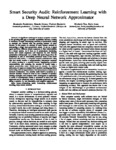Smart Security Audit: Reinforcement Learning with a Deep Neural Network Approximator
| dc.contributor.author | Pozdniakov, K | |
| dc.contributor.author | Alonso, E | |
| dc.contributor.author | Stankovic, V | |
| dc.contributor.author | Tam, K | |
| dc.contributor.author | Jones, Kevin | |
| dc.date.accessioned | 2020-05-20T10:10:01Z | |
| dc.date.issued | 2020-06-15 | |
| dc.identifier.isbn | 9781728166902 | |
| dc.identifier.uri | http://hdl.handle.net/10026.1/15693 | |
| dc.description | No embargo required | |
| dc.description.abstract |
A significant challenge in modern computer security is the growing skill gap as intruder capabilities increase, making it necessary to begin automating elements of penetration testing so analysts can contend with the growing number of cyber threats. In this paper, we attempt to assist human analysts by automating a single host penetration attack. To do so, a smart agent performs different attack sequences to find vulnerabilities in a target system. As it does so, it accumulates knowledge, learns new attack sequences and improves its own internal penetration testing logic. As a result, this agent (AgentPen for simplicity) is able to successfully penetrate hosts it has never interacted with before. A computer security administrator using this tool would receive a comprehensive, automated sequence of actions leading to a security breach, highlighting potential vulnerabilities, and reducing the amount of menial tasks a typical penetration tester would need to execute. To achieve autonomy, we apply an unsupervised machine learning algorithm, Q-learning, with an approximator that incorporates a deep neural network architecture. The security audit itself is modelled as a Markov Decision Process in order to test a number of decision-making strategies and compare their convergence to optimality. A series of experimental results is presented to show how this approach can be effectively used to automate penetration testing using a scalable, i.e. not exhaustive, and adaptive approach. | |
| dc.format.extent | 1-8 | |
| dc.language.iso | en | |
| dc.publisher | IEEE | |
| dc.subject | Pentesting | |
| dc.subject | audit | |
| dc.subject | Q-learning | |
| dc.subject | reinforcement learning | |
| dc.subject | deep neural network | |
| dc.title | Smart Security Audit: Reinforcement Learning with a Deep Neural Network Approximator | |
| dc.type | conference | |
| dc.type | Conference Proceeding | |
| plymouth.author-url | https://www.webofscience.com/api/gateway?GWVersion=2&SrcApp=PARTNER_APP&SrcAuth=LinksAMR&KeyUT=WOS:000847358100017&DestLinkType=FullRecord&DestApp=ALL_WOS&UsrCustomerID=11bb513d99f797142bcfeffcc58ea008 | |
| plymouth.date-start | 2020-06-15 | |
| plymouth.date-finish | 2020-06-19 | |
| plymouth.volume | 00 | |
| plymouth.conference-name | IEEE Cyber Science | |
| plymouth.publication-status | Published | |
| plymouth.journal | 2020 International Conference on Cyber Situational Awareness, Data Analytics and Assessment (CyberSA) | |
| dc.identifier.doi | 10.1109/cybersa49311.2020.9139683 | |
| plymouth.organisational-group | /Plymouth | |
| plymouth.organisational-group | /Plymouth/Faculty of Science and Engineering | |
| plymouth.organisational-group | /Plymouth/Faculty of Science and Engineering/School of Engineering, Computing and Mathematics | |
| plymouth.organisational-group | /Plymouth/Faculty of Science and Engineering/School of Engineering, Computing and Mathematics/SoECM - Manual | |
| plymouth.organisational-group | /Plymouth/REF 2021 Researchers by UoA | |
| plymouth.organisational-group | /Plymouth/REF 2021 Researchers by UoA/UoA11 Computer Science and Informatics | |
| plymouth.organisational-group | /Plymouth/Users by role | |
| plymouth.organisational-group | /Plymouth/Users by role/Academics | |
| dcterms.dateAccepted | 2020-04-16 | |
| dc.rights.embargodate | 2020-5-21 | |
| rioxxterms.versionofrecord | 10.1109/cybersa49311.2020.9139683 | |
| rioxxterms.licenseref.uri | http://www.rioxx.net/licenses/all-rights-reserved | |
| rioxxterms.licenseref.startdate | 2020-06-15 | |
| rioxxterms.type | Conference Paper/Proceeding/Abstract |


